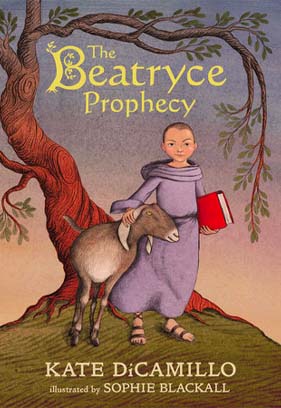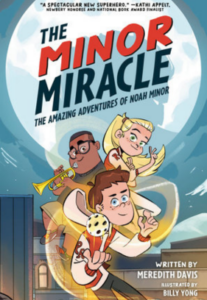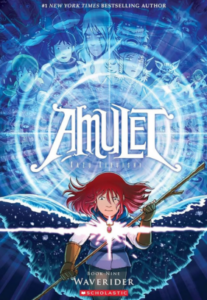When gentle Brother Edik first lays eye on Beatryce—and I say eye because one of his eyes always stays steady and true while the other rolls around in his head as if looking for something it cannot find—he thinks that she is just an ordinary girl. She’s asleep, covered in dirt and a little blood, and lying in the goat pen next to Answelica the goat.
Now, that incredible fact alone should have alerted Brother Edik to the fact that Beatryce was far from ordinary. For Answelica is perhaps the most ferocious and foul goat ever to haunt the realm. This beast long ago made it her quest in life to head-butt and viciously bite anyone who dares venture near. But here was a young girl cuddled next to the ill-tempered thing, holding its ear. And when Beatryce wakes and sits up, the goat simply looks upon her adoringly. Beatryce, for her part, has no memory of how she came to be in a goat pen belonging to the monkish Order of the Chronicles of Sorrowing. She has no knowledge of what a Chronicle even is. Nor does she remember where she came from. She remembers only her name and the fact that she can read and write.
If nothing else, her knowledge of reading and writing—something that none but royal males and monks are permitted to do—pushes Brother Edik to a realization. He suddenly understands that Beatryce could well be the girl mentioned in prophecy in their Chronicles of Sorrowing—the book that the monks work on both day and night. The Chronicles tell the story of what has happened and of things that might yet happen. And one might-yet-happen prophecy tells of a girl child who will come one day and “unseat a king.”
It’s that last bit that’s the problem. For the king of the realm knows of this prophecy, too. And he has grown tired of waiting for her prophesied arrival, sending vicious soldiers searching for her instead. That could be a very big problem for anyone in the way. So, the other monks of the Order want the girl gone.
How could this sweet young girl be the cause of so much uproar? Brother Edik wonders. She has no power, no strength, no money, no army. How could she possibly upend a kingdom and unseat a monarch? She has only her sweet, gentle kindness and the protection of a hard-headed, sharp-toothed goat. But no matter: Beatryce is sent away on her own.
She heads off, forced to hide her reading and writing talents. Forced to shave her head to hide her femininity. Forced to walk in a harrowing world toward those who wish her harm. But there is one thing that Beatryce knows for sure, without any need for force or compulsion:
We shall all, in the end, be led to where we belong. We shall all, in the end, find our way home.
She wrote those words on a bit of parchment, and they are what she believes. And that’s exactly what she will, somehow, do.











